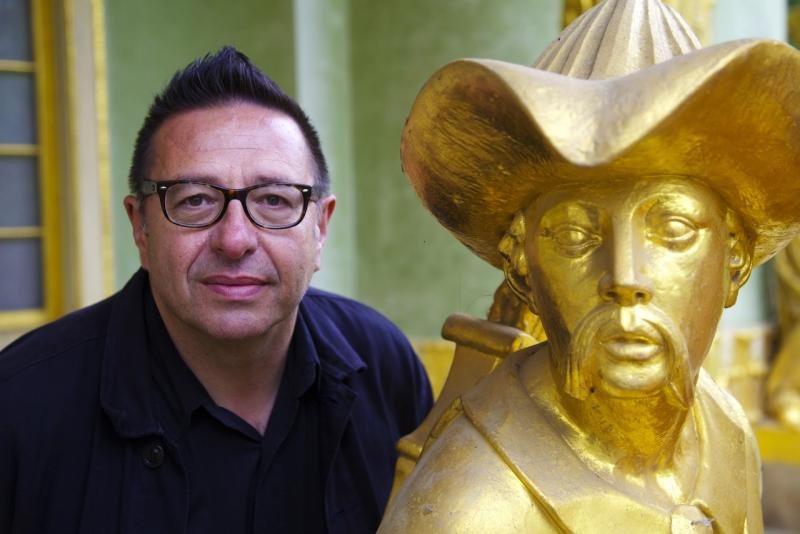Rococo: Travel, Pleasure, Madness, BBC Four | reviews, news & interviews
Rococo: Travel, Pleasure, Madness, BBC Four
Rococo: Travel, Pleasure, Madness, BBC Four
A new series on the 18th-century decorative arts movement leaves the viewer none the wiser

If you’re going to make a programme about the Rococo, that ornate and playful decorative arts movement that began in France at the start of the 18th century and flourished under the French king Louis XV, naturally you’d want to start in Bavaria. Or perhaps not. But Waldemar Januszczak does, heading off with his bag-on-a-stick and his lolloping gait in the nature of a weary pilgrim to visit a German Rococo splendour or two in stone and pastel-coloured stucco.
“Travel was one of the great inventions of the Rococo Age,” he tells us, before settling down on the steps of the Basilica of the Fourteen Holy Helpers, Balthasar Neumann’s great architectural fantasia, to unpack his bindle. From this he produced not clean underpants and a toothbrush, but his travelling “Rococo” library, namely, a copy of Swift’s Gulliver’s Travels, Defoe’s Robinson Crusoe, and that most “Rococo” of all literary delights, The Arabian Nights, translated into French for an 18th-century audience hungry for tales of the exotic.
In the end it felt like I was counting Canalettos like you might count sheep
But here you might have been tempted to enquire, perhaps in the manner of a bumptious child at the front of the classroom trying to out-do Miss, whether Adam Smith’s Wealth of Nations, or perhaps Kant’s Critique of Pure Reason, both also products of “the age”, were not “Rococo” too? After all, what’s so Rococo about a scabrous satire on humanity by that brilliant but ill-tempered Anglo-Irish misanthrope Swift? If travel is the product of the Rococo, perhaps metaphysics and economics are too? No?
No doubt, you’d have received a frosty glare for your cheek, and Januszczak had, I suppose, a kind of rhyme and reason for opening with travel as his theme rather than approaching his subject through the characteristics of style and historical provenance. But it was surely an approach that muddied rather than clarified. What’s more, it was unconvincing.
If travel, either real or fantastical, is one of the “great inventions of the Rococo”, it still didn't answer why the Rococo began in the 18th century. Why didn’t it begin earlier? And it didn’t attempt to ask why it began where it did, either. For surely the tales of Swift and Defoe are perfect examples of the picaresque novel, which has an earlier, and non-French, incarnation? And as anyone who’s heard of Chaucer will also know, religious pilgrimage isn’t Rococo, so why bring the idea of religious pilgrimage as characteristic of the age into it at all? The whole programme just left you asking “But what makes the Rococo the Rococo?”
But Januszczak isn’t a presenter to bother with questions of “where” and “why” or even “how”. He’s just not interested. And because he’s really not interested in those questions, I found myself quickly bored by tales of Clara the Rococo Rhino, who became something of a celebrity among painters and porcelain makers (now Meissen porcelain – that’s Rococo), as well as tales of other exotic creatures. (And what’s the most famous example of a rhino in art history? Well it’s not a Rococo Rhino, but one etched by Dürer, and he's definitely not Rococo. But where was Dürer when you needed him? Nowhere.) Of course, big movements never really slot that neatly into time-frames, and that was acknowledged here, but then other stuff was presented as if they were exclusive products of the age, and it felt like nonsense.
Next stop after Germany was Venice, “where reality feels dream-like and dreams feel real”, which sounds like he’d just read that off a travel brochure. Anyway, we spent the remainder of the programme with Canaletto: Canaletto in Venice, Canaletto in London, Canaletto in Windsor. In the end it felt like I was counting Canalettos like you might count sheep.
Januszczak once made a marvellous film about Manet, and for that alone I’ve always sought to give him the benefit of the doubt. But seriously, where’s Mr Graham-Dixon when you need him?
rating
Explore topics
Share this article
Add comment
The future of Arts Journalism
You can stop theartsdesk.com closing!
We urgently need financing to survive. Our fundraising drive has thus far raised £49,000 but we need to reach £100,000 or we will be forced to close. Please contribute here: https://gofund.me/c3f6033d
And if you can forward this information to anyone who might assist, we’d be grateful.

Subscribe to theartsdesk.com
Thank you for continuing to read our work on theartsdesk.com. For unlimited access to every article in its entirety, including our archive of more than 15,000 pieces, we're asking for £5 per month or £40 per year. We feel it's a very good deal, and hope you do too.
To take a subscription now simply click here.
And if you're looking for that extra gift for a friend or family member, why not treat them to a theartsdesk.com gift subscription?

Comments
Very good review. Made me
Quite agree with the review.
I agree with all the above
completely, absolutely dire